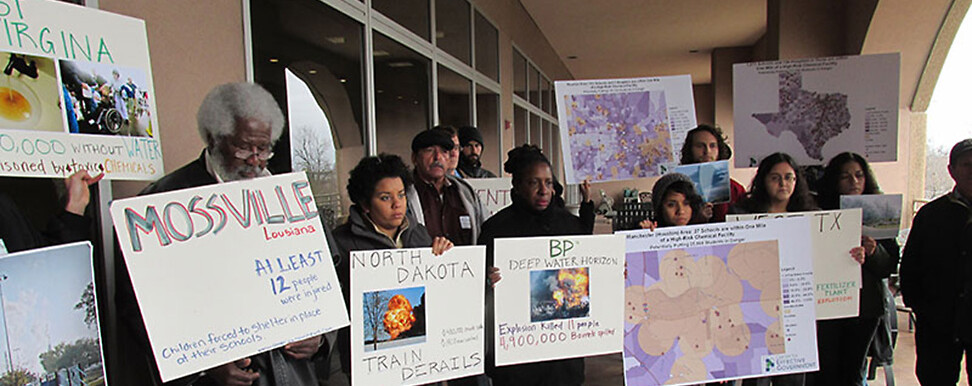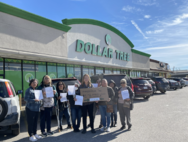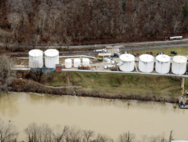

Media
Media
Share this page:
Press Releases
The Environmental Justice Health Alliance for Chemical Policy Reform (EJHA) coordinates a broad range of projects and campaigns for chemical safety and environmental justice. Below you will find official press releases by the EJHA or it's affiliates. Please contact us with media inquiries or to request interviews with spokespeople.
Steve Taylor
(802) 251-0203 ext. 703
staylor[at]comingcleaninc.org
Community-driven testing again reveals chemicals of concern in dollar store products
May 7, 2025
The Campaign for Healthier Solutions (CHS) today published the results of a year-long effort to collect, test, and screen dollar store products for chemicals of concern. Highlighted products of concern purchased at Dollar Tree/Family Dollar and/or Dollar General include: “Baby Shark” baby lotion containing a formaldehyde-releasing chemical; daily moisturizer containing a chemical banned in European cosmetics; light-up children’s bracelets, plastic roses and mini candy pails containing lead; children’s products made with polyvinyl chloride or PVC, and receipts containing bisphenol-S. Published the week of Mother’s Day, “Product Testing for the People: Pitfalls, Persistence, and Progress in Transforming Dollar Stores” provides safe shopping tips for families and actionable recommendations for Dollar Tree and Dollar General to expand, improve, and enforce their chemical policies. The report also highlights loopholes in federal law that allow companies to sell products containing chemicals of concern, showing the importance of corporate action. Take action!
Read MoreTrump Administration’s Decision to Rehash Chemical Disaster Prevention Rules Will Endanger Millions of Workers and Fenceline Community Residents
March 11, 2025
The U.S. Environmental Protection Agency (EPA) announced Thursday that it plans to rehash regulations under the Risk Management Program (RMP). The decision comes after lobbyists for the chemical industry sent a letter requesting the agency weaken the rule requiring nearly 12,000 highly hazardous industrial facilities to prevent and plan for chemical disasters.
The EPA is bending to the will of corporate lobbyists who are seeking to eliminate stronger rules finalized in 2024. These more protective rules were the result of years of public debate and incorporated input from industry and the public alike, including advocacy by environmental justice, labor, occupational and public health, and environmental organizations.
Read MoreCommunities Urge Dollar Stores to Remove Toxic Products from Shelves During Nationwide Pre-Holiday “Week of Action”
December 2, 2024
This week, supporters of the Campaign for Healthier Solutions are vising dollar stores in 30 states nationwide, with the support of health and environmental justice organizations, to demand products free of toxic chemicals.
Read MoreFollowing a generation of grassroots advocacy, EPA takes major steps to reduce cancer-causing emissions from select chemical plants
April 9, 2024
Today, following years of advocacy from environmental justice organizations, the U.S. Environmental Protection Agency (EPA) finalized a rule to significantly reduce emissions of toxic air pollution from an estimated 200 chemical plants, in an effort to reduce elevated cancer risks experienced by fenceline communities. "It has taken nearly a whole generation of hard work to arrive in DC to make this announcement,” said Nalleli Hidalgo, Education Liaison with Texas Environmental Justice Advocacy Services (tejas), who introduced EPA Administer Michael Regan at today’s White House signing event. “As we take this moment in, we remember that we are not here as individuals but as a community standing in solidarity as we witness a key moment in rulemaking to reduce the daily harm our communities face, especially frontline communities that live directly across from HON facilities.”
Read MoreUSEPA Rolls Out Rule to Address Worst-Case Chemical Disasters, Impacting Thousands of Facilities
March 21, 2024
The rule addresses a critical vulnerability in the protection of the country's waterways and communities. Thousands of facilities that manufacture, use and store some of the most dangerous chemicals brush up against waterways or are in flood-prone areas. The new policy comes after numerous disasters affecting drinking water supplies, wildlife habitats, and environmental justice communities that experience the brunt of extreme weather supercharged by climate change. “We are thankful that this administration is finally taking long overdue action to protect workers and communities against chemical disasters. Communities of color and the poor, who are experiencing the worst of the climate crisis, are also on the front lines of the fight against policies that permit billions of pounds of pollution and concentrate the most dangerous industries in our communities” said Michele Roberts, National Co-Coordinator of the Environmental Justice Health Alliance for Chemical Policy Reform (EJHA). “While we’re glad to see this rule taking steps in the right direction, we will continue to call on EPA to truly prevent disasters by transitioning away from inherently dangerous chemicals and processes as outlined in the Louisville Charter for Safer Chemicals.”
Read MoreMedia Share this page: |
What Is Environmental Justice? | Campaign for Healthier Solutions | Campaign for Healthier Solutions |
THE ENVIRONMENTAL JUSTICE HEALTH ALLIANCE IS IN STRATEGIC PARTNERSHIP WITH COMING CLEAN
info@comingcleaninc.org • (802) 251-0203 • EJHA – Coming Clean, 28 Vernon Street, Suite 434, Brattleboro, VT 05301
© 2025 Coming Clean Inc.




